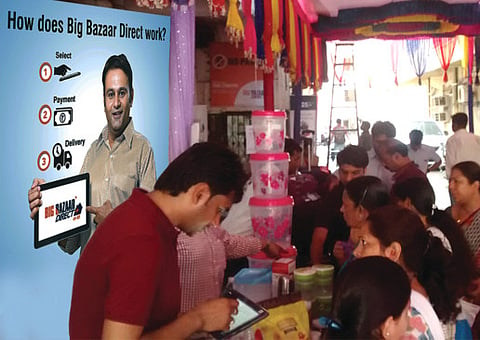Retail in therapy
While domestic retailers clamour for a piece of the e-commerce pie, international brands find that doors are not closed for foreign direct investment in India

Reliance Retail has informed its vendors that it is shutting down 100 of its Fresh stores, about one-fifth of its total footprint. And French retailer Carrefour, which was running five wholesale cash-and-carry stores in India, has announced its exit.
So far, the new government has not issued any clarifications on FDI in multibrand retail. As things stand, it has not been scrapped but the ruling party’s vocal position on opposing it when it was not in power is still in fresh recall. International ratings company Fitch has termed India’s retail policy “floppy” and said that it’s unlikely to attract “big bucks”.
But it’s online retail that is dominating the headlines, perhaps indicative of Prime Minister Narendra Modi’s fondness for cyber-tech. Modi beamed his speeches by video conferencing across the seas, and the Bharatiya Janata Party’s (BJP) cyber army not only monitors but works to influence opinion on the internet, a channel largely ignored by other political parties.
“You can’t open up many sectors as it might negatively affect a large segment of society and our economic and socio-political fabric. But then, New Gen sectors such as e-commerce and online retailing don’t fall under the traditional systems, hence it is easy to implement more liberalised policies, much faster.”
The online game
Retailers find that keeping up with the changing reality is not only rewarding but necessary. In keeping with the push towards e-commerce, wholesale stores of Walmart have already begun selling online to their registered members in Hyderabad and Lucknow, both Tier II cities. Walmart’s plans to open stores to sell directly to customers have not been realised as India restricts FDI in multibrand retail. On the other hand, US-based online retailer Amazon announced in late last month that it will invest $2 billion (about Dh7.3 billion) more in India.
Retailers are now preparing to reach the consumer via the internet to get a slice out of India’s lucrative e-commerce >
pie. In a joint report by KPMG and the Internet and Mobile Association of India (IAMAI) published in 2013, its value was estimated at about $13 billion.
Even while investing in hybrid retail models, brick-and-mortar retailers have sussed political capital — a phrase repeatedly heard in interviews with businessmen — which the government is likely to retain by keeping its core support base of small retailers happy. While they were lobbying earlier to contain online retail by having restrictive clauses in contracts with brands, most today are happy to co-exist with it.
Mass appeal
T Anupam, CEO, Runwal Malls, which builds and operates shopping centres in Mumbai suburbs, tells GN Focus, “E-commerce is far from critical mass. Most categories doing well online are non-personalised categories where people are not worried about look and feel. We have not seen our numbers drop. Its bookstores, electronics and footwear that are most popular online.
“In Tier II towns e-commerce actually fuels customers’ interest in brands and organised retail. It’s a bridge to organised retail so people get used to buying from non-traditional local retailers.”
Sandip Tarkas, President, Customer Strategy, Future Group, says, “Online retail comprises only 1 per cent of India’s total retail market. It is not about to overtake brick-and-mortar shops, even if it acquires 10 per cent of the market in ten years. Its visibility is far more than its market share. However, an omni-channel strategy gives us the chance to improve.”
One of India’s largest organised retailers, Future Group, operates Big Bazaar stores in India. It has announced that it will move its operations online by the end of the year and already operates Big Bazaar Direct, a tablet-based, franchise-driven service through which customers can place orders to be delivered later. The model involves small grocery stores, widely prevalent in India and which are said to have beaten Reliance Retail into retreat.
Tarkas says there are 180 franchises on board. “It’s our assisted digital commerce model where franchises, whether housewives or small retailers, have the customer relationship and the interface. They tie up with us and get a tablet.”
Enrolling franchises to work on a commission basis, the tablet carries the list of products available for delivery, which is taken to customers. They can select the items, enter their details and get an SMS about the amount to be paid. The franchisee gets debited and the goods are dispatched the next day. n



